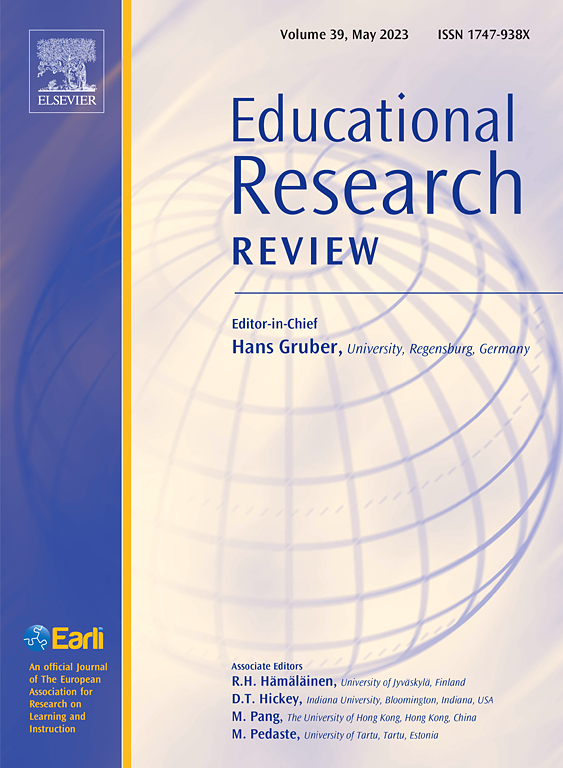Translating neuroscience to early childhood education: A scoping review of neuroscience-based professional learning for early childhood educators
IF 10.6
1区 教育学
Q1 EDUCATION & EDUCATIONAL RESEARCH
引用次数: 0
Abstract
Over the past 20 years there has been a growing international focus within early childhood education sectors on the potential benefits of neuroscience-informed approaches. This has resulted in a burgeoning of initiatives that draw upon neuroscience to influence early childhood educator practice and, in turn, children's learning and development. This study reports an international scoping review of professional learning programs for early childhood educators that are based on the translation of neuroscience research to practice. A total of 15 studies were included with the professional learning approaches documented variously aiming to build educator knowledge, support educators to embed specific practices, and/or deliver a structured intervention with children. There were largely positive reports across studies of boosts in educator knowledge, attitudes, confidence, and self-efficacy in relation to neuroscience. In several studies, educators also reported changes to their practice, improvements in the quality of their relationships with children, and reduced stress levels. Child outcomes were less often reported, with two of the three studies reporting these documenting enhanced child social-emotional development from delivery of a specific intervention by educators. Implementation fidelity was an important aspect with high fidelity linked with better documented outcomes. Overall, the robustness of the evidence for neuroscience-based professional learning for early childhood educators is mixed, with the majority of included studies not including a comparison group, and thus causality cannot be claimed. We propose a theory of change model for this field of work, and note the current limited research focussed on outcomes beyond initial changes in educator attitudes and knowledge. There is potential for design of more comprehensive approaches to embed neuroscience in early childhood education. Future scaling up of effective programs, and design of new ones, requires deeper understanding of program implementation and points to the need for comprehensive evaluations incorporating both process and outcomes assessment.
将神经科学转化为幼儿教育:基于神经科学的幼儿教育专业学习范围综述
在过去的 20 年里,国际幼儿教育界越来越关注神经科学方法的潜在益处。因此,利用神经科学来影响幼儿教育工作者的实践,进而影响儿童的学习和发展的举措层出不穷。本研究报告对基于神经科学研究转化为实践的幼儿教育工作者专业学习计划进行了国际范围的综述。本研究共纳入了 15 项研究,所记录的专业学习方法旨在培养教育者的知识、支持教育者嵌入特定实践和/或对儿童进行结构化干预。在各项研究中,教育工作者在神经科学方面的知识、态度、信心和自我效能都有了很大程度的提高。在几项研究中,教育工作者还报告了他们在实践中的变化、与儿童关系质量的改善以及压力水平的降低。儿童成果的报告较少,三项研究中有两项报告了教育工作者通过实施特定干预措施促进儿童社会情感发展的情况。实施的保真度是一个重要方面,高保真度与更好的成果记录相关。总体而言,有关幼儿教育工作者基于神经科学的专业学习的证据的稳健性参差不齐,所纳入的大多数研究都不包括对比组,因此不能断言因果关系。我们为这一领域的工作提出了一个变化理论模型,并注意到目前除了教育者态度和知识的初步变化外,对成果的研究还很有限。我们有潜力设计出更全面的方法,将神经科学融入幼儿教育。未来要推广有效的计划和设计新的计划,需要对计划的实施有更深入的了解,并指出需要进行综合评估,既包括过程评估,也包括结果评估。
本文章由计算机程序翻译,如有差异,请以英文原文为准。
求助全文
约1分钟内获得全文
求助全文
来源期刊

Educational Research Review
EDUCATION & EDUCATIONAL RESEARCH-
CiteScore
19.40
自引率
0.90%
发文量
53
审稿时长
57 days
期刊介绍:
Educational Research Review is an international journal catering to researchers and diverse agencies keen on reviewing studies and theoretical papers in education at any level. The journal welcomes high-quality articles that address educational research problems through a review approach, encompassing thematic or methodological reviews and meta-analyses. With an inclusive scope, the journal does not limit itself to any specific age range and invites articles across various settings where learning and education take place, such as schools, corporate training, and both formal and informal educational environments.
 求助内容:
求助内容: 应助结果提醒方式:
应助结果提醒方式:


